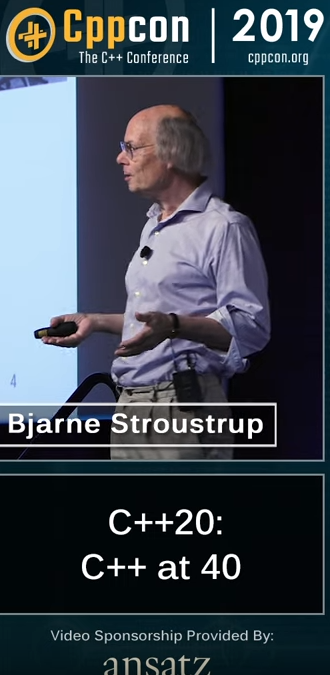CppCon 2019: De-fragmenting C++: Making Exceptions and RTTI More Affordable and Usable--Herb Sutter
 What do you think about it?
What do you think about it?
De-fragmenting C++: Making Exceptions and RTTI More Affordable and Usable
by Herb Sutter
From the video:
A fundamental reason why C++ is successful and loved is its adherence to Stroustrup’s zero-overhead principle: You don’t pay for what you don’t use, and if you do use a feature you can’t reasonably code it better by hand. In the C++ language itself, there are only two features that violate the zero-overhead principle, exception handling and RTTI – and, unsurprisingly, these are also the only two C++ language features that every C++ compiler has switches to turn off and that are regularly discouraged or even banned. This matters because not using these features is the largest current cause of fragmentation of the C++ community into incompatible dialects, and the cause of recurring problems including type confusion security vulnerabilities arising from “didn’t down-cast using dynamic_cast because that would be too slow.” This talk is about ongoing long-term efforts to try to unify the community in this area, not by replacing exceptions and RTTI, but by doubling down: fully embracing exceptions and RTTI, and improving them so they can be zero-overhead too.

 More are coming!
More are coming! The first videos are becoming available.
The first videos are becoming available. The first videos are arriving!
The first videos are arriving! Yesterday's CppCon opening keynote is up:
Yesterday's CppCon opening keynote is up: We’re in the final countdown to this year’s CppCon, which starts on September 16. To whet your appetite for this year’s conference, here’s another of the top-rated talks from last year. Enjoy – and
We’re in the final countdown to this year’s CppCon, which starts on September 16. To whet your appetite for this year’s conference, here’s another of the top-rated talks from last year. Enjoy – and  We’re in the final countdown to this year’s CppCon, which starts on September 16. To whet your appetite for this year’s conference, here’s another of the top-rated talks from last year. Enjoy – and
We’re in the final countdown to this year’s CppCon, which starts on September 16. To whet your appetite for this year’s conference, here’s another of the top-rated talks from last year. Enjoy – and  We’re in the final countdown to this year’s CppCon, which starts on September 16. To whet your appetite for this year’s conference, here’s another of the top-rated talks from last year. Enjoy – and
We’re in the final countdown to this year’s CppCon, which starts on September 16. To whet your appetite for this year’s conference, here’s another of the top-rated talks from last year. Enjoy – and